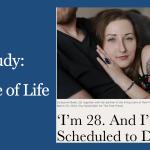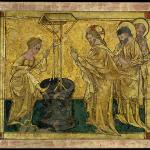This week’s quote builds on Monday’s post about the impact of the Santa Claus story on children. Unsurprisingly, in Discworld, Christmas is a little stranger. In Hogfather, Death must take over the duties of the Santa-analogue, after an attempt is made on his life. In the passage below, Death explains to his mostly-mortal daughter, Susan, why the Hogfather can’t be allowed to perish. (Note, in Discworld, Death always speaks in ALL CAPS).
‘All right,’ said Susan. ‘I’m not stupid. You’re saying humans need… fantasies to make life bearable.’REALLY? AS IF IT WAS SOME KIND OF PINK PILL? NO. HUMANS NEED FANTASY TO BE HUMAN. TO BE THE PLACE WHERE THE FALLING ANGEL MEETS THE RISING APE.“Tooth fairies? Hogfathers?”YES. AS PRACTICE. YOU HAVE TO START OUT LEARNING TO BELIEVE THE LITTLE LIES.“So we can believe the big ones?”YES. JUSTICE. MERCY. DUTY. THAT SORT OF THING.“They’re not the same at all!”YOU THINK SO? THEN TAKE THE UNIVERSE AND GRIND IT DOWN TO THE FINEST POWDER AND SIEVE IT THROUGH THE FINEST SIEVE AND THEN SHOW ME ONE ATOM OF JUSTICE, ONE MOLECULE OF MERCY. AND YET— Death waved a hand. AND YET YOU ACT AS IF THERE IS SOME IDEAL ORDER IN THE WORLD, AS IF THERE IS SOME . . . SOME RIGHTNESS IN THE UNIVERSE BY WHICH IT MAY BE JUDGED.“Yes, but people have got to believe that, or what’s the point—”MY POINT EXACTLY.
The major question here is whether Death is making an existentialist kind of statement, in which humans are constructing justice and mercy simply for the purpose of staying sane. If that is the case, they are no more true that Santa Claus, but may be useful or necessary. It turns out that moral ideals fall into the politics and sausages category. No matter how much we need them, lay people are better off not knowing too much about these ideas.
The crucial actors in the Santa story become the parents, rather than the children. The most important step in the story is not the children’s discovery of their parents’ deception, but their own decision to become complicit in that deception when they have children of their own. We must engage in a kind of doublethink to be able to construct a world we can live in.
It’s a plausible reading of this passage, but I don’t believe it. Before we accept justice and mercy as lies, we should take a harder look at the standard of truth we’re using. And Pratchett has shown us this one before.
In a different Pratchett book, the Auditors (the malevolent, abiotic force behind the Hogfather’s disappearance here) apply this same standard of inquiry to art. The Auditors carefully disassemble a painting into each component color and fail to discern Beauty in the proportions of pigment.
It’s an obviously silly moment. We know that these concepts are useful and at least semi-universal, even if we can’t use the same standard to prove them as we use in most other cases. The real question we’re trying to settle is are these concepts absolute or arbitrary. Like C.S. Lewis (and for many of the same reasons) I come down firmly on the absolute side for morality and am leaning the same way on Beauty. Both have certain universals that don’t appear to be culturally or historically contingent (an appeal to fairness for morality, using controlled instances of disorder to highlight order for art) and applications of these principles that are dependent on the cultural moment. About this, more to come.















